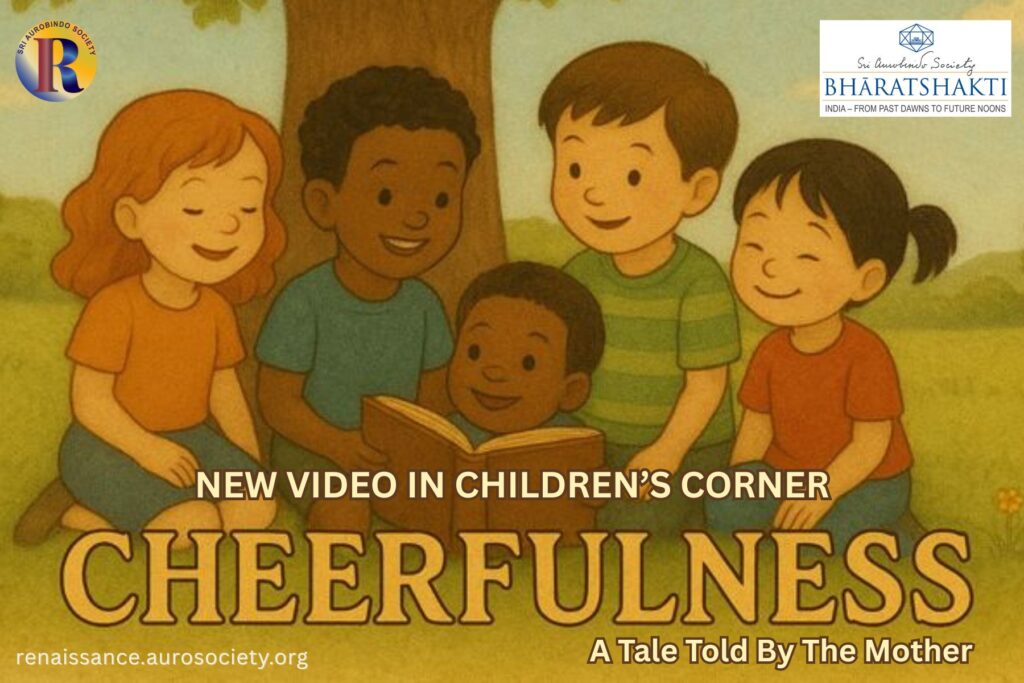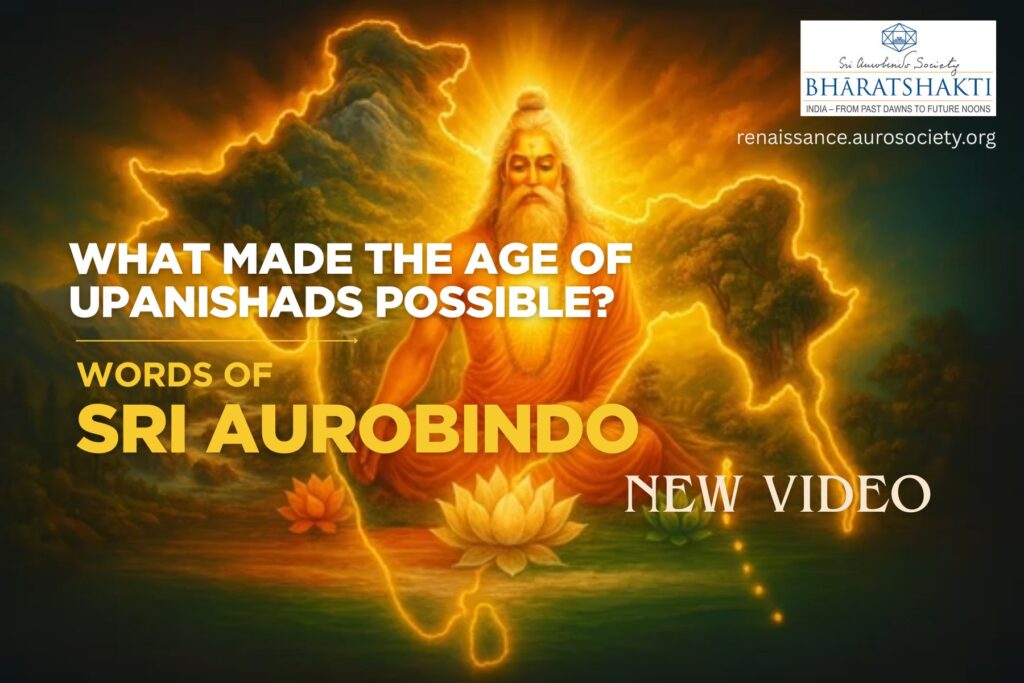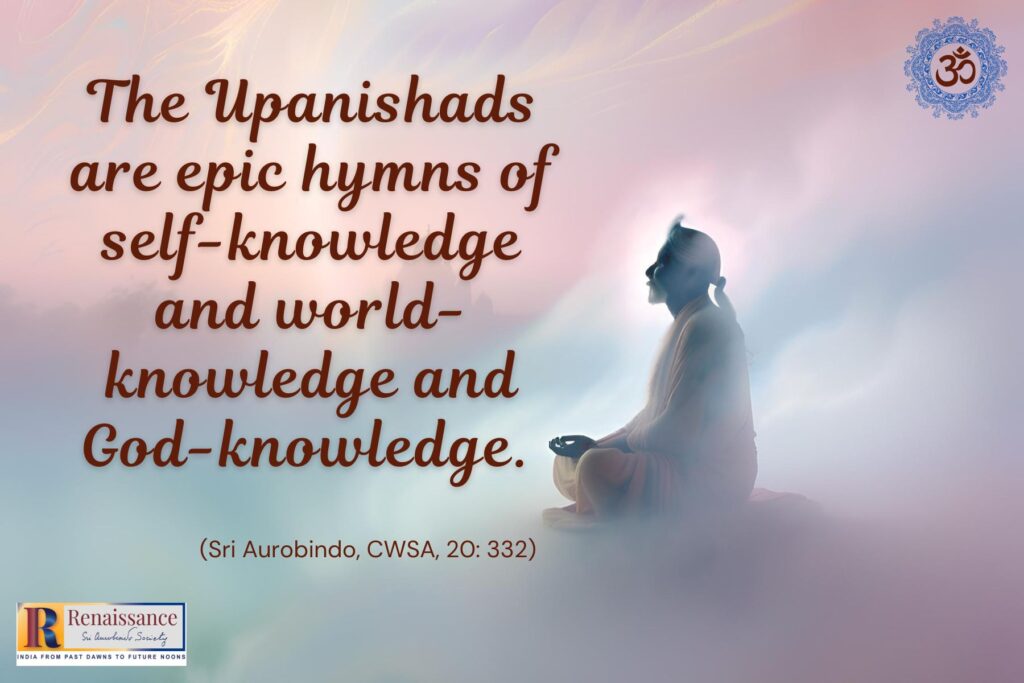Editor’s note: As part of our year-long theme ‘Streams of Sadhana’, we are happy to announce the start of this new series. Through beautifully crafted stories and simple commentaries, Lopa Mukherjee is going to take readers on a journey that explores the deep wisdom, truth and beauty of the Upanishads. In every issue over the next year we will publish a story by her. Each story shall reveal a new dimension and uncover for us some deep truth from this magnificent body of sacred literature.
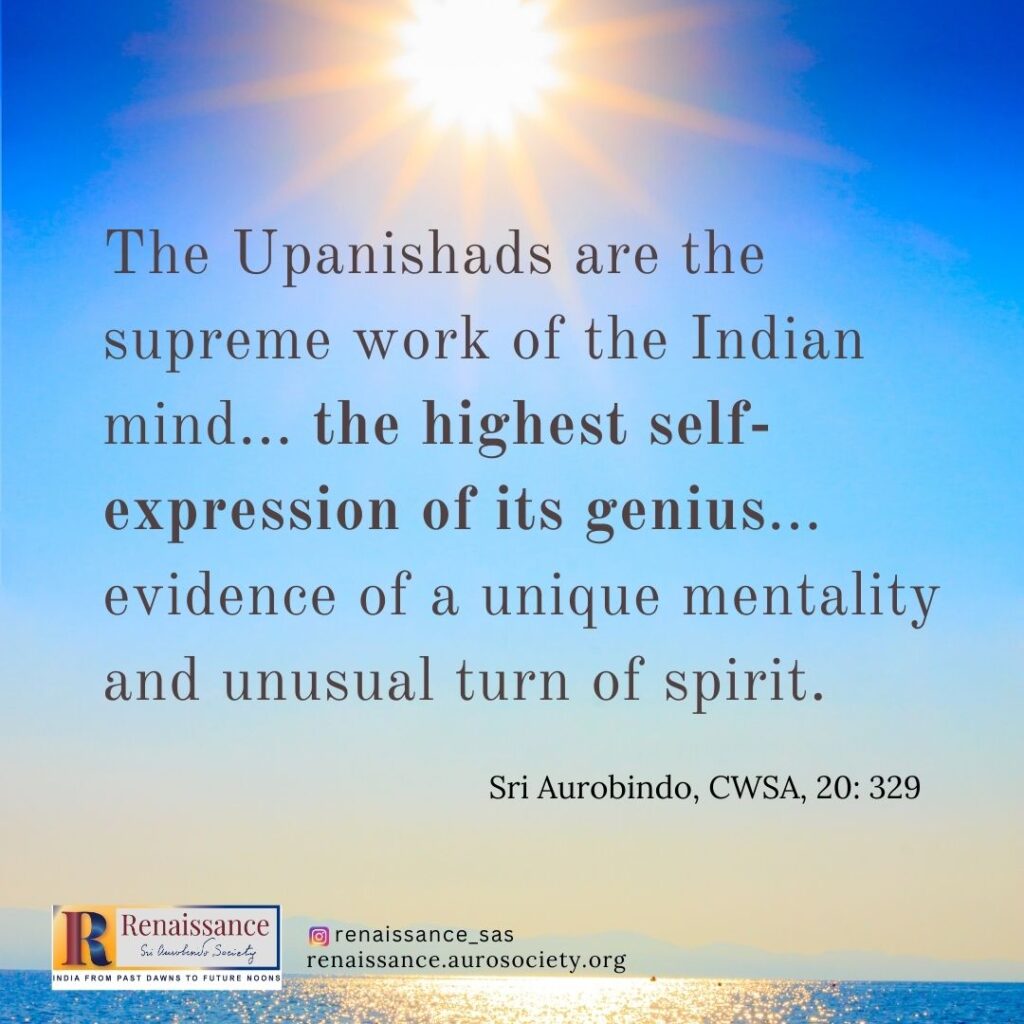
***
Author’s Introduction to the Series
The Vedanta literature, in particular the Upanishads and the Bhagavad Gitā, mark the high point in Indian wisdom literature. They are written in a mantric language called Devabhāshā, commonly known as Sanskrit. The language is aphoristic, almost cryptic, whether written as prose, in a conversation or as a poem. Not only the brevity in a language that is not mainstream, but also the profundity of the subject matter can be challenging.
Through this series I invite readers to the world of the Vedanta by presenting these pearls of wisdom in a way that elucidates the concepts. This is achieved through stories and short commentaries replete with examples. The Sanskrit slokas are woven in the narrative with their translations and transliterations. Sometimes notes are added at the end to explain a little more and give a wider context to the slokas. The hope of writing this series is to acquaint the curious reader and invite the serious ones to delve deeper into this realm.
These wisdom texts are not just Indian cultural and spiritual gems, but the civilisational inheritance of all of humanity. These are works that charm the hearer, entice the imagination, touch the soul and transform the being. Also these works beg to be engaged with because the time is ripe for them to be discovered and put into practice.
Story: Keepers
Let me start by telling you a story from Indian folklore.
A king went to a barber to get a haircut. When the barber lifted the crown, he found a pair of horns sticking out of the royal head. He shrieked, but was instantly hushed with a promise that his head would roll if the secret ever leaked. The barber held his tongue and pushed the secret down his gullet. The secret lodged in his stomach and caused him much discomfort.
One day he could take it no longer. He whispered, “The king has a pair of horns” to a bamboo tree. Not long after the bamboo was fashioned into a flute and was bought by a snake charmer. Soon in the crowded market place, everybody heard the bamboo flute sing out, “The king has a pair of horns.”
So, says the proverb, if you want to share something with everybody, whisper it in one person’s ears and label it “top secret”. In fact, by one definition, a secret is something everybody gets to know one man at a time.
Here’s another story from an Irish myth.
A lonely man living in the hills was once visited by a beautiful woman who took pity on him. She would become his wife and serve him well. But he had to keep a secret. She was an excellent sprinter, in fact she was supernatural, because indeed she was not from our earthly realm. If he broke his promise she would have to abandon him.
The man promised and started a new phase in his life. Married life brought him joy and prosperity. She could accomplish much more than any mortal woman and the man made a fortune. Soon his wife was expecting a child. When he went to the town to sell his wares he saw a notice for a running race. He forgot about his promise and boasted that his wife was the fastest runner that ever trod on earth.
The word reached the king, who ordered his wife to race. The man fell at the king’s feet and asked to be pardoned for his wife was nine months pregnant. But kings are kings. She was dragged to the public place and asked to race. She looked at her weeping husband in dismay, but honoured his word. She ran and beat all the others. After she crossed the finishing line, in front of a gaping crowd, she gave birth to her child. The crowd dispersed, the husband came running to beg for her forgiveness, but all that was left was a helpless infant.
The man was a poor keeper of his wife’s secret. She was a good keeper of her husband. The two added to a small amount of joy followed by a great loss and a long period of misery.
The lesson I take from this story is that if you have a gift, use it effectively, but don’t boast about it.
***
It would seem humans are not good keepers of secrets. There may be a reason for it. For, when humans keep secrets to themselves, often it complicates interpersonal relations. It shows a lack of trust. But such is the situation of the world so far. We have learnt not to trust after being betrayed time and again.
Nations keep their secrets from each other and train a slew of secret agents for that purpose. There is an international market for secrets where they are bought and sold at a high price.
But this essay is not about secrets and trust. It is about keepers, of which a secret is just one kind of keeping.
What does it mean to be a keeper?
A keeper is entrusted by someone to hold on to something valuable. It is a privilege to be trusted, but also a responsibility. Parents were our keepers when we were young, and we become theirs when they grow old. During the marriage ceremony the husband vows to be a keeper of his wife, and the wife vows to be the keeper of her husband. Kings are keepers of their people, and the people are keepers of the law of the land.
In the Mahabharata, Arjuna was asked to be a keeper of several dharmas at once. In an ascending order they were kula dharma, kshatriya dharma, rāshtriya dharma, yuga dharma – all the dharmas to which he was through his birth situation. His royal blood made him a role model for his people. His warrior’s creed made him a hero in the battlefield. He had to fight for his clan, he had to uphold justice, he had to lead by example, he had to be a patriot, and he had to be a champion of the Time Spirit.
But above them all he had to be the keeper of higher dharmas.
His human birth bound him to the dharma of nobility, courage, equality for all. The hierarchy of dharmas does not end there. Man has to uphold his soul’s choice, his swadharma. Arjuna was lucky to have the supreme lord as his teacher who told him what it was. And now we are lucky that we can follow the Bhagavad Gita and know what our highest dharma is. “Nimitta mātram bhava Savyasāchin,” said the lord, “Become the instrument of the Supreme.”
***
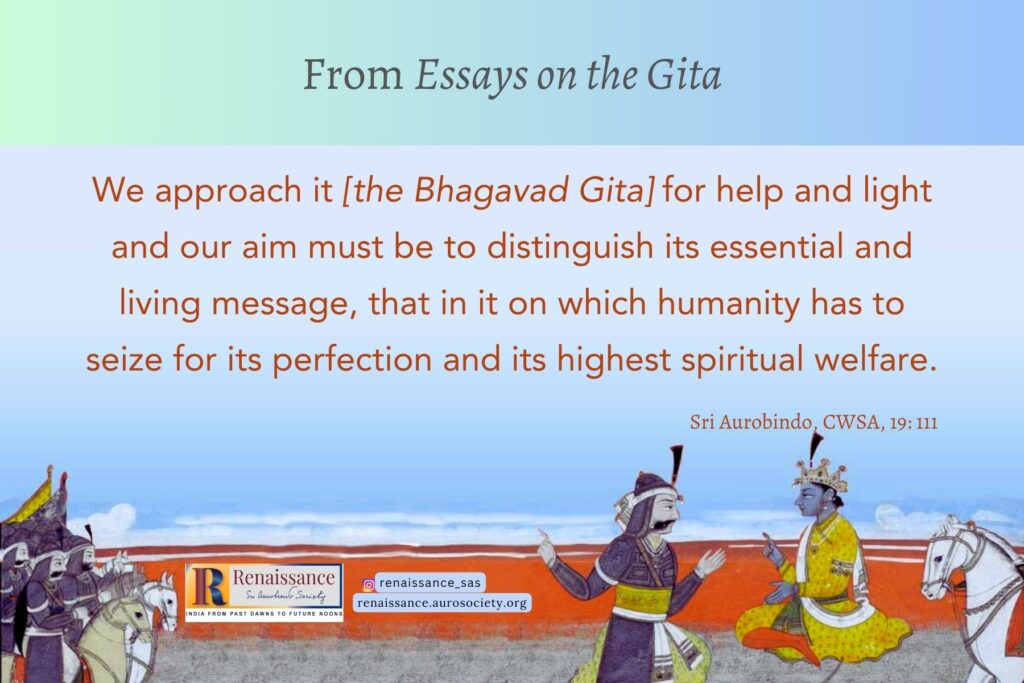
But what about the lower order dharmas we have to keep?
Several tribes that live in the hills in India are bee keepers. They live symbiotically with bees. They plant flowers for the bees and leave the trees alone where their honeycombs grow. They know how to extract the surplus honey without smoking out the colony of bees. Bees are not just the producer of a human food, but as pollinators they are essential for a new generation of crops. It turns out bees are our keepers, rather than us theirs. Or while bees keep themselves, the rest of the species of plants and animals are also kept alive.
Parasparam bhāvayantah shreyah param avāpsyatha
परस्परं भावयन्तः श्रेयः परमवाप्स्यथ (Bhagavad Gita, 3.11)
“You will attain to the supreme good by fostering each other,” the Divine Teacher points out to his human disciple.
He was speaking about gods and men and asking them to be keepers of each other. If man forgets to keep the nature gods, his environment will not keep him in turn.
***
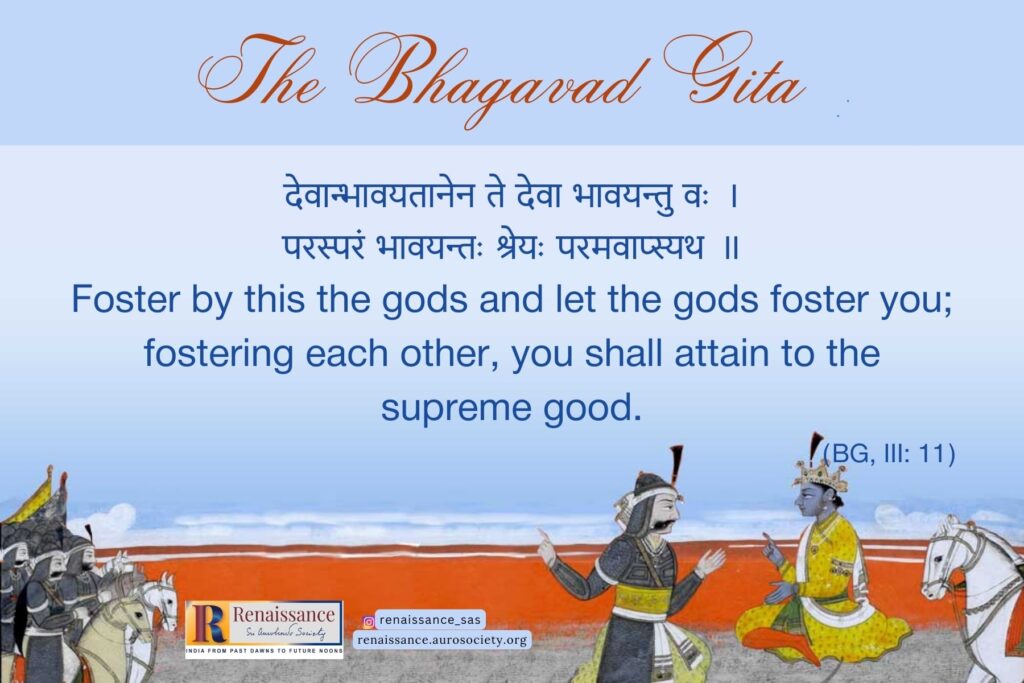
***
In another episode of the Mahabharata, prince Yudhishthira answers the yaksha cryptically using a reflexive figure of speech for dharma. Dharmo rakshati rakshitam. That which you uphold upholds you in turn.
This mutuality of life and its goal was also pointed out by the Mother in her aphorisms on education:
“Every one of you should have an aim. But do not forget that on the quality of your aim will depend the quality of your life.
~ The Mother, CWM, Vol. 12, p. 3
Your aim should be high and wide, generous and disinterested; this will make your life precious to yourself and to others.”
***

You become what is becoming to you. Act as a god and you will become godlike. Act as a demon and your very face will turn devilish. Mutuality is the law of life, as encapsulated in the Golden Rule: if you keep others well they will keep you well. If you mistreat others, they will mistreat you in return. A sheep dog keeps the sheep safe. Perhaps instinctively it senses that its meat comes from selling the wool of the sheep. And man is essential in the equation for he trains sheep dogs and sheers the sheep. He cooks and feeds both sheep and dog for they feed him in turn.
So we are keepers of our family, just as they keep us. By family I mean those who share a meal under a roof. When this keeping becomes constricting we seek bigger roles. We start businesses and employ people, we become leaders and teachers. The community keeps us while we help them grow. Some people are generous to the next level. They give more than they care to get. Some people see beyond the human family and become keepers of street dogs, whales, or endangered species.
Then there are those who are keepers of ideals, such as the purity of a practice, the propagation of a religion, the upholding of a value. In “The Catcher in the Rye” the teenager protagonist wanted to be a keeper of innocence. He described it graphically as being the one standing at the end of a rye field at the edge of a cliff, catching children who are close to falling off, so that the children can play without any worry.
Such is the duty of a gatekeeper, protecting the inside from the outside, allowing only some to pass through, holding back others. Some are zealous gatekeepers of what they think is right and will fight for it, like the Crusaders and the anti-West squads in Eastern nations.
The nurturing of a knowledge system, a wisdom tradition, a cultural artefact is an important keeping.
During the Renaissance the arts and classics of the ancient world were rediscovered by new keepers. The tradition of shamanism is passed on to a young person who is called to be the bridge between two worlds. The ancient science of marma vidyā is taught to an able initiate just as a new Dalai Lama is trained as per the Tibetan Buddhist tradition.
One man can be a keeper of a whole tradition, a gharāna, an esoteric knowledge, rare manuscripts, healing practices, specialized skills. When he passes, there could be a breakage in the transmission, as has happened in the disappearance of stories, customs, languages, rituals, processes.
When dreams are not passed on, all of humanity suffers a loss. Some lost traditions are pieced together again in a university, and a keeper takes it back to the people it once belonged to, as what happened to the Mayan script. As for the Egyptian hieroglyphics, when they were deciphered, there were no people to receive them. All the keepers of the ancient world had passed one way or the other. Perhaps nature was so tortured she could not nurture man anymore. Perhaps its time was over.
***
From our archives
Sri Aurobindo on Isha Upanishad
There is a lot that needs keeping, nurturing, improving, propagating, and as keepers we are also nurtured by it. So, let us find something we can keep. It will give us a direction, a map, a compass, a timeline; and rounding up all this a fresh enthusiasm, a new purpose and meaning to living.
Knowing well what we keep keeps us, let us choose something grand and noble, something a little beyond our current capacities, something we aspire for. Something that needs nurturing, perhaps to break away from its past, or something that needs us to be midwives to be born, something that asks us be creative for the old form will not fit the new manifestation.
Let us choose something deliberately and not wait for the angel to whisper it in our ears. Angels work through trial and error too and often use human instruments to convey their messages. There is a great joy in being responsible for something bigger than one’s ego self. And when we find it, we’ll know that there is a reason why it has chosen us to be its keepers.
If you are chosen to keep a place, make it pure, make it sacred. Called to keep a wisdom tradition? Know it well, teach it generously and add something worthy to it. Keepers of a knowledge system, expand with it and enlarge its boundaries. If you are the keeper of a people, let them progress. If you a keeper of a garden, let it grow towards the light. Keepers of dreams, keep dreaming big. And if your dreams don’t come true, do pass on your dreams.

The only keeper that does not need keeping is perhaps the one who has fashioned this rule of mutual keeping.
A passage from the Brihadāranyaka Upanishad describes the role of such a Keeper, who needs no keeping for He is the imperishable one, the akshara.
The keeper of people, King Janaka, calls upon the keepers of wisdom, the rishis, to debate on Truth. During the discourse, rishi Yajyavankya explains to rishikā Gargi:
This Imperishable, O Gargi, keeps the sun and moon in their courses
~ Brihadāranyaka 3.8.9
एतस्य वा अक्षरस्य प्रशासने गार्गि सूर्यचन्द्रमसौ विधृतौ तिष्ठत
This Imperishable, O Gargi, keeps the earth and heaven
एतस्य वा अक्षरस्य प्रशासने गार्गि द्यावापृथिवौ विधृते तिष्ठत
This Imperishable, O Gargi, keeps the moments and hours, days and nights, fortnights and months, seasons and years
एतस्य वा अक्षरस्य प्रशासने गार्गि निमेषा मुहूर्ता अहोरात्राण्यर्धमासा मासा ऋतवः संवत्सरा इति विधृतास्तिष्ठन्ति
This Imperishable, O Gargi, keeps the rivers flowing from the snow-peaked mountains towards the east and west and all directions
एतस्य वा अक्षरस्य प्रशासने गार्गि प्राच्योऽन्या नद्यः स्यन्दन्ते श्वेतेभ्यः पर्वतेभ्यः प्रतीच्योऽन्या यां यां च दिशमनु
This Imperishable, O Gargi, keeps the men who keep the gods and ancestors through offerings, sacrifices and austerities
एतस्य वा अक्षरस्य प्रशासने गार्गि ददतो मनुष्याः प्रशसन्ति यजमानं देवा दर्वीं पितरोऽन्वायत्ताः॥
***
And also this,
This Imperishable, O Gargi, is unseen but is the seer, is unheard but is the hearer, is unthinkable but is the thinker, is unknown but is the knower
~ Brihadāranyaka 3.8.11
तद्वा एतदक्षरं गार्ग्यदृष्टं द्रष्ट्रश्रुतश्रोत्रमतं मन्त्रविज्ञातं विज्ञातृ
There is no seer but He, there is no hearer but He, there is no thinker but He, there is no knower but He
नान्यदतोऽस्ति द्रष्टृ नान्यदतोऽस्ति श्रोतृ नान्यददतोऽस्ति मन्तृ नान्यदतोऽस्ति विज्ञातृ
In the Imperishable one, O Gargi, the ether is woven, warp and woof
एतस्मिन्नु खल्वक्षरे गार्ग्य्याकाश ओतश्चेति॥
Series to be resumed soon
with another story. . .
~ Design: Kavita, Beloo, Biswajita, Vijayatha

